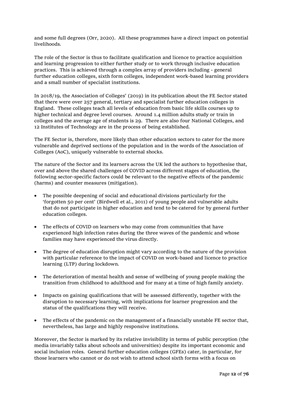
Page 12 of 76
and some full degrees (Orr, 2020). All these programmes have a direct impact on potential
livelihoods.
The role of the Sector is thus to facilitate qualification and licence to practice acquisition
and learning progression to either further study or to work through inclusive education
practices. This is achieved through a complex array of providers including - general
further education colleges, sixth form colleges, independent work-based learning providers
and a small number of specialist institutions.
In 2018/19, the Association of Colleges' (2019) in its publication about the FE Sector stated
that there were over 257 general, tertiary and specialist further education colleges in
England. These colleges teach all levels of education from basic life skills courses up to
higher technical and degree level courses. Around 1.4 million adults study or train in
colleges and the average age of students is 29. There are also four National Colleges, and
12 Institutes of Technology are in the process of being established.
The FE Sector is, therefore, more likely than other education sectors to cater for the more
vulnerable and deprived sections of the population and in the words of the Association of
Colleges (AoC), uniquely vulnerable to external shocks.
The nature of the Sector and its learners across the UK led the authors to hypothesise that,
over and above the shared challenges of COVID across different stages of education, the
following sector-specific factors could be relevant to the negative effects of the pandemic
(harms) and counter measures (mitigation).
• The possible deepening of social and educational divisions particularly for the
'forgotten 50 per cent' (Birdwell et al., 2011) of young people and vulnerable adults
that do not participate in higher education and tend to be catered for by general further
education colleges.
• The effects of COVID on learners who may come from communities that have
experienced high infection rates during the three waves of the pandemic and whose
families may have experienced the virus directly.
• The degree of education disruption might vary according to the nature of the provision
with particular reference to the impact of COVID on work-based and licence to practice
learning (LTP) during lockdown.
• The deterioration of mental health and sense of wellbeing of young people making the
transition from childhood to adulthood and for many at a time of high family anxiety.
• Impacts on gaining qualifications that will be assessed differently, together with the
disruption to necessary learning, with implications for learner progression and the
status of the qualifications they will receive.
• The effects of the pandemic on the management of a financially unstable FE sector that,
nevertheless, has large and highly responsive institutions.
Moreover, the Sector is marked by its relative invisibility in terms of public perception (the
media invariably talks about schools and universities) despite its important economic and
social inclusion roles. General further education colleges (GFEs) cater, in particular, for
those learners who cannot or do not wish to attend school sixth forms with a focus on